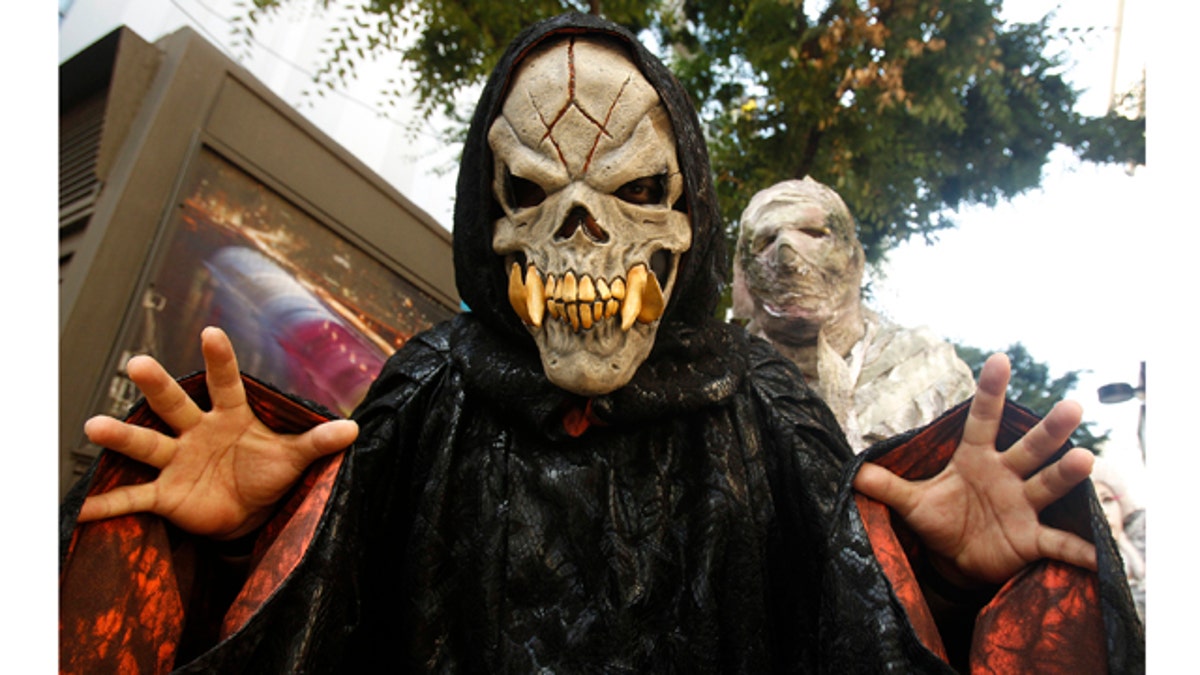
Costumed performers from an amusement park pose during a promotional event "Happy Halloween & Horror Night" at the Myeongdong shopping district in Seoul September 5, 2011. The event was held to generate publicity for activities in Everland Amusement Park during the Halloween season from September 9 to October 31. REUTERS/Truth Leem (SOUTH KOREA - Tags: SOCIETY)
The one time of the year when kids are free to dress up as monsters, superheroes and reality TV stars while eating candy until their bellies hurt is on the endangered holiday list in communities around the nation.
Citing cultural issues, safety and even the economy, schools and towns across the country are banning Halloween plans. But the backlash isn't just coming from children. Many of their parents say the war on Halloween has gone too far.
“There will be no costumes, no candy bags and no parties,” said Skokie, Ill., District 69 Superintendent Quintin Shepherd, in a letter to parents. “Many students cannot afford costumes and there is an economic disparity. We also have students that are unable to participate for religious or cultural reasons.”
[pullquote]
Parents and students say Halloween is a secular holiday, and one which allows children to express their creativity through costumes and designs. Some parents and students even joined together at a park near the school as a show of protest.
“Why suck the fun out of school?” one student posted online on the school's website. “Halloween isn't a religious or political holiday; it's only about having fun.”
“It’s the best part of the school year,” posted another student. “Everyone dresses up and gives out candy. How can that be bad?”.
Administrators say school is not the place for Halloween, and at least a few parents in Skokie agree.
“We'll take a personal day with my children away from school expressing ourselves through costume and possible Satan worshipping,” wrote one poster on the District 69 website.
Nationwide, over the past year, about a dozen schools tried to ban costumes, parties and/or parades, but some were clearly spooked by the backlash from the community, and gave up the battle.
In Levittown, Pa., the annual Halloween parade at Ralph Waldo Emerson Elementary School that’s been in place for decades was cancelled, until the vocal outrage of dozens of parents led school officials to reinstate it.
“I’m so sad. I have my Power Ranger costume all ready,” said third-grader Julia Schall.
“Will we still get candy?” said worried fifth-grader Eric DiGon.
In Portland, Ore., principal Brian Anderson told parents he banned Halloween because he worried that students whose culture or religion didn’t allow them to celebrate would feel excluded from the others, especially as more and more immigrants with different cultures arrive in this country.
“We’re pushing our traditions on an ever-changing population,” he told the local newspaper.
Said parent Sue Afryl, “What this ban is teaching is intolerance…. By banning one or all we teach not to be accepting of cultural and religious beliefs other than our own... They have now taught intolerance! A lesson no child should ever be given.”
For those who support the ban, it's not just the cultural concerns, it's also the message being sent to children who have Halloween as an excuse to consume large amounts of candy.
“We already have an obesity problem among American children," said one school nurse who didn’t want her name used.
In addition to cultural, religious and cost concerns, Shepherd also blamed the ban on the federal “No Child Left Behind” Act, apparently claiming the holiday could take valuable time away from preparing for standardized tests.
“While education can be, and is, creative and fun – we must respond to the current national reality of high stakes testing," Shepherd told FoxNews.com "Until NCLB is rewritten into legislation that is reflective of individual student progress and achievement, the consequences will continue to become more severe.”
In many cities, towns and school districts, Christmas and other specific religious celebrations around December are being called by the more generic term of “holiday” celebrations. Now with the non-religious holiday of Halloween being banned, critics call it “political correctness gone too far”.
“Schools have taken away other holiday recognitions as well," complained Afryl. "They've banned the pledge of allegiance to our flag and country, and have omitted the word God. Whether you believe in something or not, is it correct to ban it? Is it right to suppress it?”

